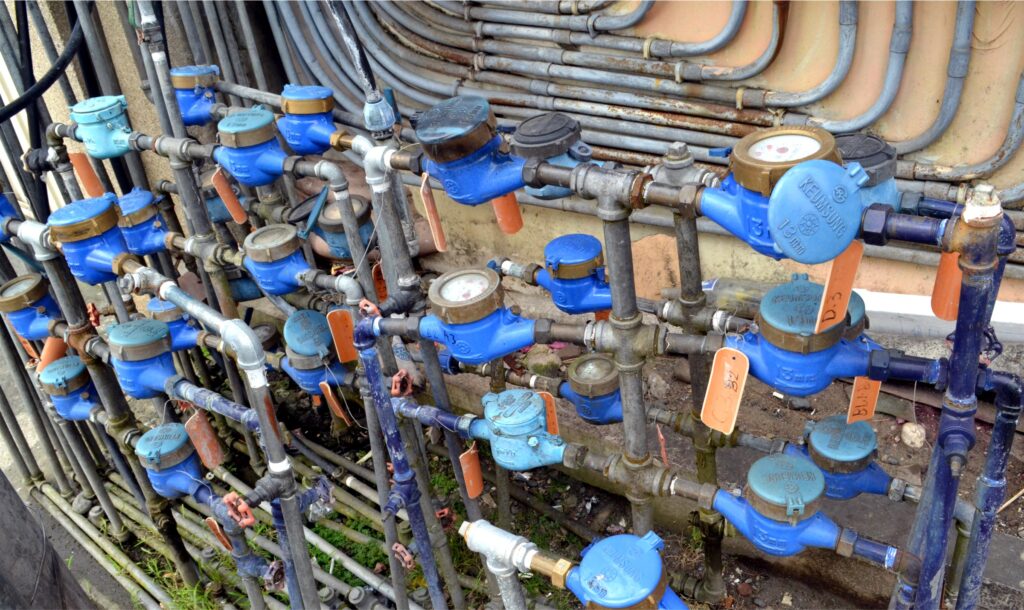Text and Photos by Henrylito D. Tacio
Water is life itself. Like air, it is essential for man’s survival. After all, water makes up more than two-thirds of the weight of the human body. Without water, humans would die in a few days.
As Dr. Willie T. Ong pointed out in his book, How to Live Longer: Practical Health Tips from a Heart Doctor: “No water, no life. Our bodies are made up of mostly water. Just look at these facts: The brain contains 74% water, blood contains 83% water, lean muscle has 75% and bone has 22% water.”
That’s why when you are thirsty, drink water. “Getting enough water every day is important for your health,” the US Centers for Disease Control and Prevention (CDC) reminds. “Healthy people meet their fluid needs by drinking when thirsty and drinking with meals. Most of your fluid needs are met through the water and beverages you drink.”

Water meters 
Water crisis 
Water scarcity
Other sources
There are other sources of water aside from the obvious glass of water. “You can also get this critical nutrient from food,” says the website, www.universalclass.com. “Vegetables like lettuce, cucumber, tomato, sugar snap peas, and celery have a very high-water content, which also makes them very low in calories but still high in nutrient value. Fruits like oranges, pineapples, strawberries, and others, also have high water content. Broth based soups, milk, and juices do contain a high percentage of water.”
If you have a choice, go for whole fruit or vegetable over a juice. An orange, for instance, contains healthy fiber that makes you feel full. It also takes some effort and time to peel and eat the orange. “If you just drink a glass of orange juice, you get much less fiber,” the website says. “It’s a lot easier to drink a few hundred calories worth of orange juice than it is to eat a few hundred calories worth of whole oranges.”
Functions
Water is essential because it has several functions within the human body. For one, “it transports nutrients and other compounds. As a major component of the blood, water helps move glucose, water-soluble vitamins, minerals, other nutrients and some medications throughout your body,” the website states.
If you’re hot, water is the best antidote. The website explains: “When you become too hot, your blood vessels dilate and you start sweating. The sweat evaporating on your skin is cooling. Water also has a high heat capacity. This means that a lot of energy is needed to increase its temperature. Since the body contains more water than anything else, it takes quite a significant amount of heat to raise your body temperature.”
Eating any kind of food is harder when there is no saliva. “Fortunately, our salivary glands produce ample saliva, which is largely water,” the website states. “Tears lubricate and clean the eyes, and synovial fluid lubricates your joints. Cerebrospinal fluid protects your brain and spine from trauma. Similarly, amniotic fluid surrounds and shields the fetus. Fluids throughout your body protect and lubricate your organs and tissues.”
More importantly, water participates in metabolism. “Most chemical reactions in your body use water in at least one of three ways: a solvent, a reactant or a product of the chemical reaction,” the website explains. “Water produced in chemical reactions is called metabolic water, and your body uses it in the same ways it uses the water you drink.”
How much
The question is: how much water do we need to drink each day? “Drink 8 to 12 glasses a day,” wrote Dr. Ong in his book. “According to the Mayo Clinic, a 120-pound individual needs 8 cups of water a day, while a 190-pound person requires 12 cups daily. Dr. Robert Tanchanco says that we should monitor our urine color and keep it on the light side.”
But don’t overdrink water. In an article which appeared in “Daily Mail,” Sophie Borland wrote that drinking too much water “can be bad for your health.” She said that British actor Anthony Andrews, who starred in the ITV adaptation of “Brideshead Revisited,” was hit by the illness after drinking too much water during rehearsals for a West End role in 2003.
Borland cited a study done by Glasgow-based GP Margaret McCartney, which showed that drinking when not thirsty “can impair concentration, rather than boost it.”
Writing in the British Medical Journal, Dr. McCartney also pointed out that “drinking excessive amounts can also lead to loss of sleep as people have to get up in the night to go to the toilet, and other studies show it can even cause kidney damage, instead of preventing it.”
In some instances, drinking too much water may lead to a rare but potentially fatal condition called hyponatremia. This condition occurs when the sodium level in the blood is abnormally low and can lead to swelling of the brain.
There are people who drink too much water because they claim water helps them lose weight as it suppresses their appetite. Professor Stanley Goldfarb, an American metabolism expert from the University of Pennsylvania, disagrees. “The current evidence is that there really is no evidence,” he says. “If children drank more water rather than getting extra calories from soda, that’s good… (but) there is no evidence that drinking water before meals reduces appetite during a meal.”
In a way, water is not fattening, as some people claim. Dr. Alberto Quirantes Hernandez, a Cuban professor of medicine and chief of endocrinology services at the Dr. Salvador Allende Teaching Hospital in Havana, wrote: “It is good news for those trying to lose weight that drinking more water helps, because it increases calorie-burning by the body as it is absorbed, distributed, metabolized and eliminated. We can also say it is the only nutrient that does not add a single calorie.”
Drinking water properly
Dr. Ong, in his book, gives some tips on how to drink water the proper way:
· Drink water when you wake up. Your body loses water while you sleep, so drink a glass before you go to sleep and another glass when you wake up. You are naturally thirsty or dehydrated in the morning. Drinking water in the morning helps flush out the toxins that have accumulated all night.
· Drink little by little throughout the day. It is preferable to sip water throughout the day rather than to drink two glasses all at once. This will lessen the stress on the heart (especially if you have heart disease) and give your body more time to absorb it.
· Don’t wait until you’re thirsty to drink water. By the time you feel thirsty, you’re probably two glasses below your everyday water needs. Older people are also less sensitive to the body’s need for water.
· Drink water, not soft drinks, alcohol, or coffee. Some experts believe that tea, sodas, and coffee can be potentially dehydrating. Moreover, the high phosphorus and sugar content in cola drinks can lead to conditions like osteoporosis and diabetes. One study shows that adults who drank six cups of coffee daily experienced mild dehydration. Drinking alcohol is much worse because it actually dehydrates you by making you urinate a lot.
· Drink more as you exercise. When you exercise, you need to drink more water to compensate for fluid loss. Go for an extra 50 milliliters of water for a 30-minute to 1-hour exercise. Eating a banana also helps keep your potassium up.
· Drink more when you’re sick. Even though you don’t feel like it, you really need to drink more water to help you recover from various infections. If you’re dehydrated, you’ll feel much worse.

